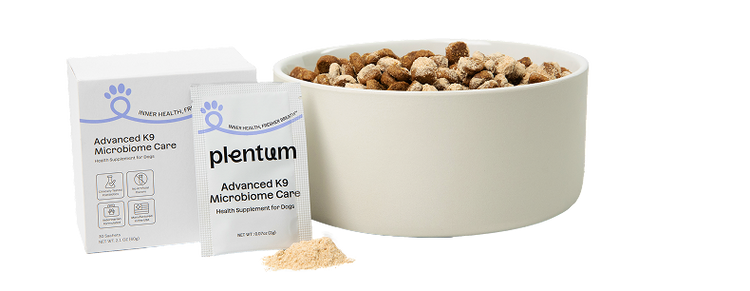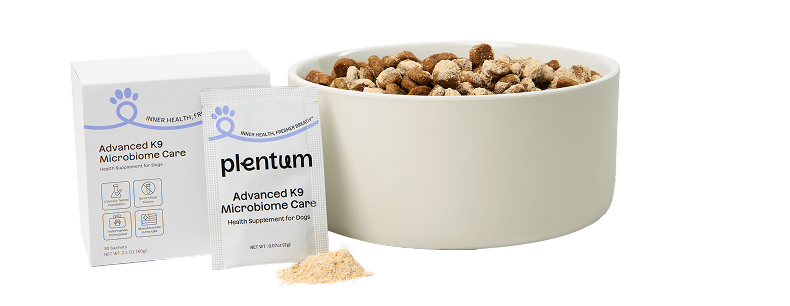
Is your dog's digestive health a top priority? It should be! A healthy gut is the cornerstone of a dog's overall well-being. Probiotics offer a natural way to boost gut health, improve digestion, and even reduce inflammation. While every dog is unique, research shows that these "good bacteria" can provide significant benefits.
What Are Probiotics and Why Does My Dog Need Them?

Probiotics are live, beneficial microorganisms that support the host's health when given in the right amounts. Think of them as tiny helpers for your dog's digestive system.
- A Delicate Balance: Your dog's gut health is a complex ecosystem. A healthy balance of bacteria is crucial for everything from nutrient absorption to immune function.[1][2][3][4]
- Common Disruptors: This balance can be easily upset by common factors like diet changes, stress, infections, or a course of antibiotics.
- Dogs as a Model: Interestingly, the canine gut is very similar to the human gut, making dogs excellent models for probiotic research.
Key Digestive Benefits of Probiotics
A More Balanced Gut
- Probiotic supplements are proven to positively alter a dog's gut microbiota, enhancing beneficial bacteria without disrupting the natural balance. [5]
- Less Diarrhea: In one controlled trial, dogs given probiotics had a 0% incidence of diarrhea compared to 16% in the control group. [6]
- Probiotics help restore the natural gut community, leading to better gastrointestinal health.
- Certain strains can even improve how well your dog digests fiber, leading to better nutrient absorption. [7][8]
- They are a useful tool for managing common GI issues stemming from eating habits, food sensitivities, or enzyme deficiencies. [1]
The Anti-Inflammatory Power of Probiotics

Reducing Body-Wide Inflammation
- One of the most significant benefits is the ability of probiotics to reduce inflammation.
- Specific probiotic strains, like Lactobacillus reuteri C1 and Lactobacillus acidophilus C5, have been shown to decrease inflammatory markers and calm the immune response.
Fighting Hidden Inflammation
- Probiotics can combat "natural endotoxemia," a low-grade inflammatory condition that may not have obvious symptoms.
- A multi-strain formula reduced endotoxin levels by over 20% in healthy dogs and nearly 45% in dogs with gut imbalance.
Top Probiotic Strains for Dogs

The Lactobacillus Family
- Lactobacillus acidophilus: A well-researched, highly effective strain for dogs.
- Lactobacillus plantarum: Known for its strong ability to inhibit harmful bacteria.
- Lactobacillus rhamnosus: Well-tolerated by the canine gut and provides immune benefits.
Why Multi-Strain Formulas Are Often Better
Research shows that combining strains like Lactobacillus casei, Lactobacillus plantarum, and Bifidobacterium animalis can lead to better results in weight gain, immune function, and gut diversity.
More Than Just Digestion: Other Health Perks
- Immune System Boost: Probiotics can increase antibody levels, signaling a stronger, more balanced immune system.
- Stress Reduction: The strain Enterococcus faecium has been shown to lower stress hormone levels in dogs during transport.
- Benefits for Senior Dogs: Older dogs respond particularly well, with their gut microbiota shifting to resemble that of younger dogs after 60 days of treatment.
Safety, Dosage, and Key Considerations
Are Probiotics Safe?
Yes, probiotics are considered very safe for dogs, with minimal side effects and no negative impacts on general health parameters.
How Much Should I Give?
- Daily Dose: Generally between 100 million and 2 billion CFU, depending on your dog's size.
- Duration: The most effective results are often seen after 30 to 60 days of consistent use.
- Host-Specific Strains: Probiotics derived from healthy dogs may be more effective.
Important Note: Probiotics are for long-term health maintenance, not a quick fix. They excel at preventing issues and maintaining balance.
How to Choose and Use Probiotics
When Should I Consider Probiotics?
Your dog may benefit if they experience:
- Recurring dog diarrhea or digestive upset
- Recovery from antibiotic use
- Food allergies or sensitivities
- Stress-related digestive issues
- Age-related decline in digestion
- A need for general immune support
Your Probiotic Checklist

When choosing a product, look for:
- Canine-Specific Strains: Isolated from healthy dogs.
- Multi-Strain Formulas: For broader benefits.
- Guaranteed CFU Count: To ensure potency.
- Proper Storage Instructions: To maintain viability.
The Future is Gut Health
Research continues to evolve, but the evidence is clear: probiotics are a promising tool for improving your dog's health. More studies will help pinpoint the perfect combinations and dosages for specific conditions.
Conclusion
The science strongly supports that probiotics can improve digestion and reduce inflammation in dogs by balancing gut bacteria and enhancing immune function.
Always consult your veterinarian to create the best plan for your dog's individual needs. With the right approach, probiotics can play a key role in helping your dog live a long, healthy, and happy life.





